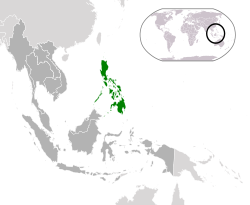边那巴多共和国
边那巴多共和国 Republic of Biak-na-Bato Repúbliká ng̃ Biak-na-Bató República de Biac-na-Bató | |||||||||||||
|---|---|---|---|---|---|---|---|---|---|---|---|---|---|
| 1897年—1897年 | |||||||||||||
 边那巴多共和国在亚洲地图上的位置 | |||||||||||||
| 地位 | 未受承认国家 | ||||||||||||
| 首都 | 圣米格尔 | ||||||||||||
| 常用语言 | 西班牙语、他加禄语 | ||||||||||||
| 政府 | 共和国 | ||||||||||||
| 总统 | |||||||||||||
| 历史时期 | 菲律宾革命 | ||||||||||||
• 建立 | 1897年11月1日 | ||||||||||||
• 终结 | 1897年12月15日 | ||||||||||||
| 面积 | |||||||||||||
| 1897年 | 300,000平方公里 | ||||||||||||
| |||||||||||||
边那巴多共和国(英语:Republic of Biak-na-Bato,他加禄语:Repúbliká ng̃ Biak-na-Bató, 西班牙语:República de Biac-na-Bató),又译为破石洞共和国或比阿克纳马多共和国,被部分菲律宾人认为是国内第一个宪制共和国,为菲律宾第一共和国的前身。其缔造人是菲律宾革命领袖埃米利奥·阿奎纳多及其领导的卡蒂普南革命组织。安达斯·波尼斯奥领导卡蒂普南进行巴林塔瓦克起义后,阿奎纳多应声参加革命,后阿奎纳多与波尼斯奥发生分歧,阿奎纳多在特赫洛斯大会上领导通过了解散卡蒂普南、建立边那巴多共和国的决议。
虽然边那巴多共和国成立了菲律宾第一部共和制宪法,但它的寿命只维持了一个月,随着西班牙殖民军加大反扑攻势,阿奎纳多与殖民当局签订投降协议,自己则流亡香港,边那巴多共和国宣告解体。
历史[编辑]
卡蒂普南及巴林塔瓦克起义[编辑]
1892年7月,菲律宾反殖民革命派安达斯·波尼斯奥成立秘密组织卡蒂普南,1896年8月26日卡蒂普南因计划败露而提前起义,因起义地在奎松巴林塔瓦克山,史称巴林塔瓦克起义。在卡蒂普南的号召下,菲律宾全境纷纷揭竿而起,埃米利奥·阿奎纳多就在此时在甲米地发动起义,占领了甲米地全境因而名声大噪。
革命过程中,保守派阿奎纳多和主战派波尼斯奥的矛盾愈加激烈。1896年10月,阿奎纳多发布文告,将建立革命政府,却只字不提卡蒂普南。12月,革命大本营迁往甲米地,阿奎纳多拒不接受卡蒂普南的命令。1897年2月,在西班牙殖民军的围剿下,卡蒂普南退至吕宋北。[1]
特赫洛斯大会及临时政府[编辑]
1897年3月22日,在阿奎纳多任主席的特赫洛斯大会(Tejeros Convention)上,阿奎纳多及其支持者“马格达洛委员会”决议解散卡蒂普南、成立共和国临时革命政府。阿奎纳多当选为总统,马里亚诺·特里亚斯当选为副总统。然而波尼斯奥拒不承认大会的决定,也不承认革命政府,宣称要带领卡蒂普南继续革命。[2]5月10日,波尼斯奥及其部下被阿奎纳多派人逮捕并以“叛国”之罪名处决,波尼斯奥的妻子亦未能逃过遭到强暴的厄运。[3]
边那巴多共和国[编辑]
1897年5月,西班牙加大反扑攻势,阿奎纳多临时政府被迫放弃甲米地。7月,西班牙政府要求革命军放下武器,阿奎纳多发表《致菲律宾英勇子民》(To the Brave Sons of the Philippines),提出了停火条件:
- 驱逐方济各会传教士,并归还其占有的土地;
- 允许菲律宾在西班牙议会占有席位;
- 实现出版自由和,对宗教信仰实行宽容政策;
- 给予半岛籍和孤岛籍出身的政府公务员以相同的薪水待遇;
- 废止政府驱逐公民的权力;
- 全民平权。[4]
8月,阿奎纳多临时政府突破重围迁往布拉干省边那巴多山区,至此双方战事零星,进入相持状态。11月1日,阿奎纳多在边那巴多召开代表会议,通过边那巴多共和国宪法,由阿奎纳多任总统,其临时政府的总统一职依法终止。[5]。根据宪法,1897年11月2日成立“全国最高委员会”,作为国家议会。宪法序言部分作出如下声明:
The separation of the Philippines from the Spanish monarchy and their formation into an independent state with its own government called the Philippine Republic has been the end sought by the Revolution in the existing war, begun on the 24th of August, 1896; and therefore, in its name and by the power delegated by the Filipino people, interpreting faithfully their desires and ambitions, we, the representatives of the Revolution, in a meeting at Biac-na-bato, Nov. 1st. 1897, unanimously adopt the following articles for the Constitution of the State.[6]
投降西班牙殖民政府[编辑]
1897年底,菲律宾总督普里莫·德里维拉(Primo de Rivera)认识到镇压革命军已无可能,于是决定派遣马尼拉著名律师佩德罗 A. 帕特诺(Pedro A. Paterno)与阿奎纳多政府进行谈判。帕特诺早在革命期间就斡旋于双方政权,穿梭外交的努力终于换来阿奎纳多的妥协,促成阿奎纳多与殖民政府于1897年12月14日签订《边那巴多条约》(Pact of Biak-na-Bato,或译《破石洞条约》)。边那巴多共和国成立仅一个月便宣告解体。[7]。
根据条约内容,西班牙政府不逮捕革命者也不追究其责任,给予阿奎纳多集团十万比索,在菲律宾实行行政和立法改革,3年内实行菲律宾自治;而革命组织需要解散军队,停止武装斗争,阿奎纳多被驱逐出境(后流亡香港)。条约声明全文如下[8]:
(1) That I would, and any of my associates who desired to go with me, be free to live in any foreign country. Having fixed upon Hongkong as my place of residence, it was agreed that payment of the indemnity of $800,000 (Mexican) should be made in three installments, namely, $400,000 when all the arms in Biak-na-Bató were delivered to the Spanish authorities; $200,000 when the arms surrendered amounted to eight hundred stand; the final payment to be made when one thousand stand of arms shall have been handed over to the authorities and the Te Deum sung in the Cathedral in Manila as thanksgiving for the restoration of peace. The latter part of February was fixed as the limit of time wherein the surrender of arms should be completed.
(4) It was also agreed that the religious corporations in the Philippines be expelled and an autonomous system of government, political and administrative, be established, though by special request of General Primo de Rivera these conditions were not insisted on in the drawing up of the Treaty, the General contending that such concessions would subject the Government to severe criticism and even ridicule.[8]
(2) The whole of the money was to be paid to me personally, leaving the disposal of the money to my discretion and knowledge of the understanding with my associates and other insurgents.
(3) Prior to evacuating Biak-na-Bató the remainder of the insurgent forces under Captain-General Primo de Rivera should send to Biak-na-Bató two General of the Spanish Army to be held as hostages by my associates who remained there until I and a few of my compatriots arrived in Hongkong and the first installment of the money payment (namely, four hundred thousand dollars) was paid to me.
政府概况[编辑]
宪法及制度[编辑]
边那巴多共和国宪法由菲利克斯·费勒(Felix Ferrer)与伊萨贝罗·阿塔琼(Isabelo Artacho)根据古巴宪法几乎是原文照搬而来。这部宪法实行民主共和制、“最高委员会制”(议会制),于1897年12月2日正式实施。
主要领袖[编辑]
“最高委员会”人员如下[9]:
| 职位 | 姓名 |
|---|---|
| 总统 | 埃米利奥·阿奎纳多(Emilio Aguinaldo) |
| 副总统 | 马里亚诺·特里亚斯(Mariano Trías) |
| 外交部长 | 安东尼奥·蒙特内格罗(Antonio Montenegro) |
| 战争部长 | 埃米利亚诺·列戈·德迪奥斯(Emiliano Riego de Dios) |
| 内政部长 | 伊萨贝罗·阿塔琼(Isabelo Artacho) |
| 财政部长 | 巴尔多梅罗·阿奎纳多(Baldomero Aguinaldo) |
参考及外链[编辑]
- ^ Don Emilio Aguinaldo y Famy, Chapter II. The Treaty of Biak-na-bató, True Version of the Philippine Revolution, Authorama: Public Domain Books. 23 September 1899 [23 September 2008]
- ^ The Project Gutenberg eBook of Dimasalang Kalendariong Tagalog (1922), by Honorio López
- ^ Ocampo 1999
- ^ Agoncillo 1990,第182–183页
- ^ Agoncillo 1990,第183页
- ^ Constitution of Biak-na-Bato, Wikisource.
- ^ Zaide 1994,第252页
- ^ 8.0 8.1 Aguinaldo 1899 Chapter II. The Treaty of Biak-na-bató
- ^ Agoncillo 1990,第183–184页


